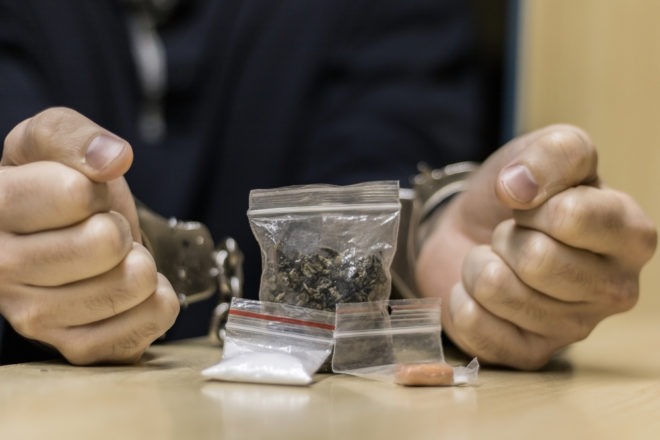

Call Attorney Marni Jo Snyder 24 Hours / 7 Days:
215.515.3360
Determining which charges you may face after a drug arrest could depend on the following:
Let a Philadelphia drug crime lawyer help you. When police arrest someone for drug possession, the person may face more than one charge. Each of these offenses is defined under 35 PA. Stat. § 780-113 is charged and graded differently, and for the person facing the charge, these cases differ primarily on their burden of proof, severity, and possible penalties.
Simple possession is the easiest for prosecutors to prove and comes with the most lenient penalties. Under the law that defines this crime, the person facing charges:
Possession means that a person has dominion or control over a thing. At its most basic, a person had an illegal drug on their person or under their control. This is the charge you might face if the police searched your car and found a small amount of cocaine or a few prescription pills not prescribed to you. This law assumes that drugs are intended for the individual’s use unless there is other evidence to support their sale or distribution.
The potential penalties for a conviction in a simple possession case include:
It is also important to note that these penalties may not apply if the individual possesses just a small amount of marijuana. While this is still illegal in Pennsylvania, the penalties are reduced. Marijuana possession is still illegal in Philadelphia; law enforcement just declines to prosecute in almost every instance.
For a free legal consultation, call 215.515.3360
Possession with intent to distribute is a much more significant charge in Pennsylvania. A person found with drugs on them could face drug distribution charges based on the following indicators.
By considering these factors, a defense lawyer can challenge the prosecution’s claims and work to build a robust defense strategy aimed at securing the best possible outcome for the defendant.
Even if there are no observed drug sales, the government may argue that the defendant should be found guilty of Possession with the Intent to Deliver because the intent for the drugs to be sold is evident.
Possession with intent to sell is always charged as a felony offense. However, it is an ungraded felony. If convicted, the severity of the penalties will depend greatly on several factors specific to the case. These factors include:
A conviction of this charge usually calls for imprisonment, although it is difficult to determine how long without assessing the facts of the case. The judge will likely consider:
In general, this could mean between one and five years behind bars. A second arrest could result in up to eight years in jail or prison. The fines for intent to distribute are also significantly larger than in most simple possession cases.
Those charged with possession – and in some cases, possession with intent to distribute – may have the option to enter the drug treatment court system if the court determines that drug addiction played a significant role in their crime. Drug courts are designed to address the underlying issues of addiction rather than simply punish the offender.
In drug court, the judge collaborates with a team that includes the defense attorney, prosecutor, probation officers, and law enforcement to support and enforce the defendant’s recovery. This multidisciplinary approach aims to provide comprehensive support, including access to treatment programs, regular drug testing, and ongoing supervision.
Participation in drug court can help break the cycle of addiction and incarceration that is prevalent across the country. It offers defendants a chance to avoid criminal prosecution if they comply with the program’s requirements. These requirements often include attending treatment sessions, passing regular drug tests, and appearing in court for progress reviews.
However, it’s important to note that if a defendant fails to abide by the program’s rules, all original charges can be reinstated, and they may face traditional prosecution. Drug court is a rigorous program that demands commitment, but it provides an opportunity for individuals to achieve long-term recovery and avoid the severe consequences of a criminal record.
As you can see, facing simple possession charges usually offers a much better outcome than possession with intent to distribute. If you cannot prove that you did not possess the illegal drugs as accused, you may want to focus on reducing the charges against you to simple possession.
Alternatively, Pennsylvania offers an Accelerated Rehabilitative Disposition (ARD) program that allows some people facing simple possession charges to avoid going to court for their crimes. Instead, they can enter into a pretrial rehabilitative program, meet its requirements, complete community service and probation, and apply to have their charges expunged. There may also be other pretrial diversionary programs available.
A good option is to work closely with a criminal defense attorney familiar with Pennsylvania’s drug laws. They will fight to help you get the most favorable outcome based on the facts of your case and the evidence prosecutors have against you.
Here are a few of the defense strategies your lawyer may use:
By combining these strategies, a defense lawyer can create reasonable doubt about the prosecution’s case, potentially leading to a dismissal or acquittal.
At the Law Offices of M.J. Snyder, LLC, our Pennsylvania criminal defense team handles drug possession cases every day. We can assess the drug charges against you and help you understand the possible outcomes of your case, including discussing diversionary programs and the benefits of ARD.
Contact us today for a free consultation. We are here to help during this stressful and challenging time.
Call 24/7: 215.515.3360
Email: info@snyderlawyer.com
Fax: 215-376-6981
This website is for general informational purposes only. The act of sending an e-mail to the Firm or any attorney at the Firm, or submitting a form response or other materials through the website, will not create an attorney-client relationship. The only way to create an attorney-client relationship with the Firm is through a written agreement.Read More